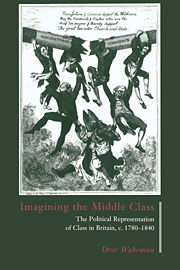6 - The tug of war and its resolution
Published online by Cambridge University Press: 08 January 2010
Summary
Any attempt … to push the great question of Radical Reform, while the middling classes continued in such a state of apathy, would have been abortive …
Something is necessary to rouse the middling classes to a sense of their perilous situation. For a long time, they have been neither willing to follow nor lead the People.
(Radical appeal to the ‘middle class’, 1819)Thus, the gathering snow-ball of rebellion rolls on, making its vast collections. If it be not impeded and dispersed by the rising of the great middle class of the community, who, from some unaccountable infatuation, have hitherto been the passive spectators of its progress, the links of society are dissolved.
(Conservative appeal to the ‘middle class’, 1819)Mackintosh's 1815 essay in the Edinburgh Review notwithstanding, from about 1809 the language of ‘middle class’ went into considerable hibernation for the better part of a decade. To be sure, this is not to say that these years simply saw no major debates in which it could be invoked. One needs only remind oneself again of the anti-war campaign against the Orders in Council, or of the debates around the corn laws in 1815, rendered acute by the distress following the end of the war: in both cases, despite what current historiographical wisdom might lead us to expect, ‘middle-class’ language played no significant role.
We may wish here to experiment momentarily with a more distant perspective on the broader pattern over time.
- Type
- Chapter
- Information
- Imagining the Middle ClassThe Political Representation of Class in Britain, c.1780–1840, pp. 184 - 220Publisher: Cambridge University PressPrint publication year: 1995



